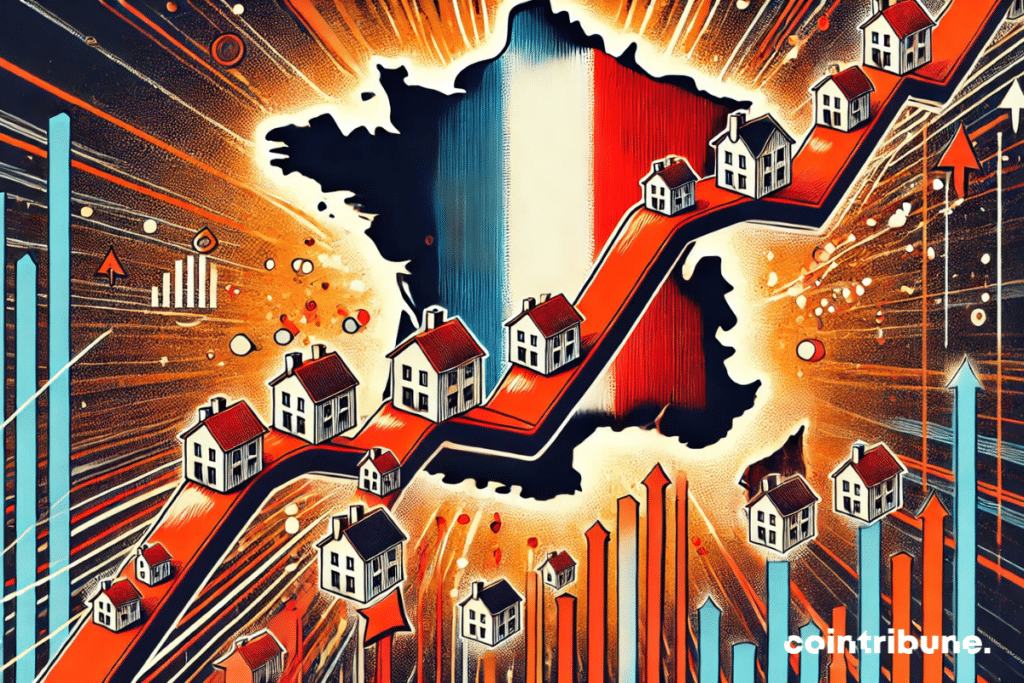French Real Estate Market Faces Historic Slowdown in 2024
The French real estate market is going through a period of turbulence, despite signs of calm after two years of marked depression. Indeed, the figures recently published by the Notaires de France reveal a double observation: property prices have fallen, but this decrease has not been enough to revive sales. Thus, in 2024, the number of transactions experienced a spectacular drop, illustrating a profound blockage in the sector. This situation, both paradoxical and alarming, raises questions about the factors hindering the market’s restart and the economic and political dynamics that amplify its complexity.

Free-fall in real estate sales : a deep crisis
In 2024, the French real estate market recorded a brutal drop in transactions, with only 750,000 sales, compared to 1.2 million in 2021. This drop of 17 % compared to the previous year occurs in a context marked by a series of unfavorable factors. Among them, the political instability that followed the parliamentary dissolution in June 2024 played a central role. Master Priscille Caignault, a notary and member of the Higher Council of Notaries, states that “this instability has pushed market players to adopt a defensive stance.” This retreat affects all market segments, whether old housing, new constructions, or building plots.
At the same time, economic conditions have not allowed for a recovery of the situation. Although real estate prices have fallen on average by 3.9 %, and interest rates for a 20-year loan have reached a relatively low level of 3.15 %, these favorable factors have not been enough to revive demand. Households continue to express great caution in the face of prevailing uncertainty. A joint study by Insee and the Banque de France also highlights a continued decrease in the real estate wealth of households, which now stands at €14,567 billion, representing a contraction of 0.9 % compared to 2023. This erosion of wealth reflects not only a loss of value of real estate assets but also an economic fragility that hinders the market’s recovery.
An increase in purchasing power, but for whom?
The drop in real estate prices in 2024 brought a measured improvement in purchasing power, estimated at +4 % over one year. However, this increase remains uneven. Households with the highest incomes are the primary beneficiaries of this trend, notably thanks to favorable credit rates hovering around 3 %, accessible only to the best financial profiles. In contrast, for middle-class households, access to credit remains complex. These households face more restrictive conditions that hinder their purchasing capacity and thus limit their participation in an already struggling market.
Such disparities reveal marked geographic fractures. For instance, a monthly payment of €800 would allow a buyer to acquire 111 m² in Saint-Étienne, but only 41 m² in Marseille, and barely 12 m² in Paris. These gaps reflect economic differences, but also disparities in terms of attractiveness and regional dynamism. The real estate market thus reflects a growing rift between large metropolitan areas, where prices remain prohibitive, and medium-sized cities, often more accessible. This situation exacerbates social inequalities, creating a divide that further hinders the balance and cohesion of the national market.
The French real estate market ends 2024 in an uncertain situation. Despite falling credit rates and a slight improvement in purchasing power, these measures remain insufficient to halt the decline in transactions. To restore confidence, professionals are calling for structural reforms capable of providing sustainable solutions, particularly by facilitating access to property for modest households. In the absence of such adjustments, disparities between regions and social categories are likely to widen further. In this context of political tensions and marked inequalities, the future of the sector will depend on decision-makers’ ability to respond to the systemic challenges that hinder a balanced recovery.
Maximize your Cointribune experience with our "Read to Earn" program! For every article you read, earn points and access exclusive rewards. Sign up now and start earning benefits.
Diplômé de Sciences Po Toulouse et titulaire d'une certification consultant blockchain délivrée par Alyra, j'ai rejoint l'aventure Cointribune en 2019. Convaincu du potentiel de la blockchain pour transformer de nombreux secteurs de l'économie, j'ai pris l'engagement de sensibiliser et d'informer le grand public sur cet écosystème en constante évolution. Mon objectif est de permettre à chacun de mieux comprendre la blockchain et de saisir les opportunités qu'elle offre. Je m'efforce chaque jour de fournir une analyse objective de l'actualité, de décrypter les tendances du marché, de relayer les dernières innovations technologiques et de mettre en perspective les enjeux économiques et sociétaux de cette révolution en marche.
The views, thoughts, and opinions expressed in this article belong solely to the author, and should not be taken as investment advice. Do your own research before taking any investment decisions.